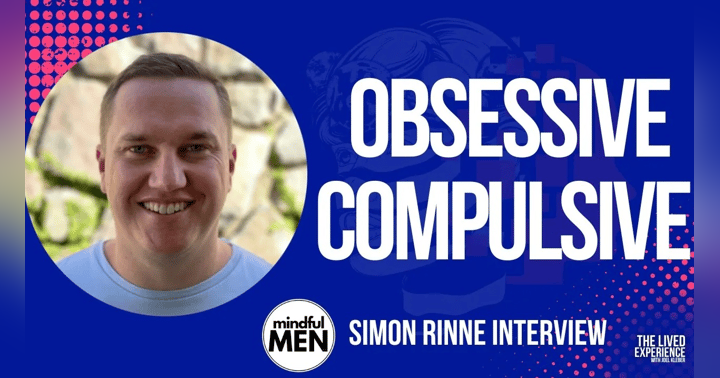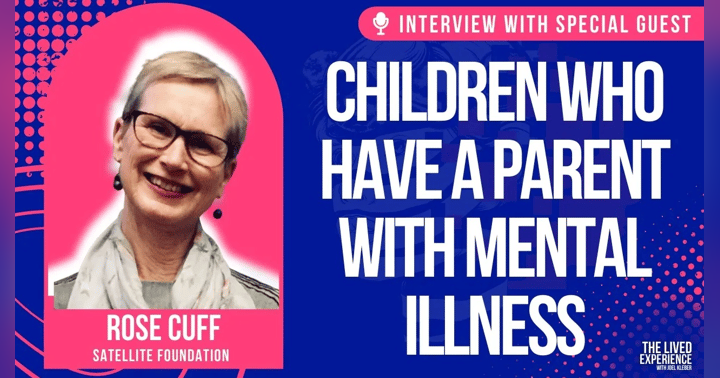A Mental Health Nurses Perspective - Interview with Georgia Livingston Part 1

Introduction - Shining a Light on Mental Health Care
The world of mental health care is complex and often misunderstood.
As mental health issues continue to be a pressing concern, it is crucial to have informed perspectives on care, treatments, and support systems.
In this blog post, we focus on the valuable insights shared by Georgia, a registered nurse specializing in mental health.
Through her experiences, we will unravel the mysteries surrounding mental health facilities and treatments, including Electroconvulsive Therapy (ECT), and understand the role of holistic care in mental health.
Watch the video interview here.
Meet Georgia - A Guardian of Mental Health Care and a Beacon of Support
In the dynamic landscape of mental health care, Georgia stands as a beacon of support and a guardian for those seeking help.
She is a registered mental health nurse, whose heart is set on nurturing and healing. Serving at a private inpatient facility, Georgia's tender care extends to individuals grappling with various mental health conditions.
Her vast experience, which encompasses adult acute units, extended stay units, as well as specialized mother and family units, and aged psychiatry units, is a testament to her versatility and commitment.
Georgia’s down-to-earth demeanor and relatability make her an accessible and comforting presence for patients and families alike. With her deep-rooted passion for mental well-being, she actively contributes to building bridges between patients and the often daunting world of mental health care.
Her insights, based on years of hands-on experience, are invaluable for anyone looking to understand the intricacies of mental health support and treatment.
Georgia’s Experiences with Mental Health Treatments and Innovations
Electroconvulsive Therapy (ECT)
Georgia explains that ECT is often viewed as a last resort due to potential side effects such as memory loss.
However, she affirms its effectiveness in treating severely depressed patients who have failed to respond to medication.
Though the procedure, involving electric shocks, can be unsettling to watch, it has proven to significantly improve the quality of life for many middle-aged and older patients.
Transcranial Magnetic Stimulation (TMS)
TMS, a relatively newer treatment, involves using magnetic impulses to stimulate brain activity.
According to Georgia, while the exact mechanics behind its success are not entirely understood, TMS has been found to be effective with fewer side effects compared to ECT.
TMS is usually given in conjunction with medications and is gaining popularity, particularly in private facilities.
s-Ketamine for Treatment-Resistant Depression:
Georgia mentions an innovative treatment using s-Ketamine, which is currently in the trial stage for treatment-resistant depression.
Unlike traditional antidepressants, s-Ketamine increases the number of synapses in the brain. It is administered as a nasal spray, but its accessibility is limited due to high costs and stringent criteria.
Deep Brain Stimulation
Though not elaborated on in detail by Georgia, she mentions that Deep Brain Stimulation is an area garnering attention.
It is known to use MRI technology and is more invasive than TMS.
Demystifying Mental Health - Georgia’s Unwavering Mission to Enlighten and Support
Knowledge is power, and when it comes to mental health, Georgia understands this deeply. Through her mission to spread awareness and education, she’s tearing down the walls of confusion and fear that often surround mental health care.
Georgia, who’s always ready with a reassuring smile and open arms, is determined to debunk the myths and get rid of the misconceptions that are all too common in society.
For Georgia, creating an informed society is not just a lofty goal; it’s a necessity. She knows that when people understand what mental health issues really are, they become more compassionate and supportive. And this, in turn, can make a world of difference for those who are struggling.
One of the ways Georgia educates the public is by holding workshops and seminars. She speaks clearly and plainly, so everyone, from teenagers to grandparents, can understand.
Her presentations are often packed with real-life stories and practical advice that leave the audience both informed and inspired.
But that’s not all. Georgia also takes to social media, where she shares relatable posts and videos.
In these easily digestible snippets, she talks about everything from anxiety and depression to the benefits of therapy and medication. Her online presence has proven to be a real boon, especially for those who might not otherwise have access to this kind of information.
What's more, Georgia actively collaborates with schools and community centers. By educating young minds and adults alike, she’s helping to build a foundation of understanding that can support mental well-being for generations to come.
Georgia's mission doesn’t stop at education. She’s also fiercely committed to fighting the stigma that often shadows mental health.
She encourages people to speak openly about their experiences and to listen without judgment. Through her tireless efforts, she is cultivating a community that not only understands mental health but is also kind and supportive of those in need.
In a nutshell, Georgia’s work is creating ripples of change, and through her steadfast dedication, she’s ensuring that mental health care is seen not as something to be whispered about, but as an essential part of overall well-being.
Her mission is truly a light leading the way in a sometimes dark and confusing world.
Georgia’s Heartfelt Journey Through the Healing World of Mental Health Care and Treatments
When we think of Georgia’s work, the words ‘compassionate guide’ come to mind. In her journey through mental health care, she has been like a captain steering a ship through the sometimes stormy waters of mental health treatment.
Her experience covers a broad spectrum and she's keen on sharing this knowledge with others.
Imagine mental health facilities as safe havens or sanctuaries - that’s how Georgia wants us to see them. They’re places where people can find the support, care, and tools they need to heal and manage their mental health issues.
A part of her voyage involves showing folks the many layers and facets of mental health care.
There’s no one-size-fits-all when it comes to treating mental health, and Georgia ensures people know this. From inpatient programs, which are like live-in support systems, to acute wards, where individuals can get help during severe mental health episodes, the care is varied and tailored.
Now let’s talk about subacute wards, another crucial stop in Georgia’s journey. These are for folks who might not need super intense treatment but still need a helping hand. Like a warm cup of tea on a cold day, it’s comforting to know these places exist for those in need.
Also, Georgia doesn't shy away from discussing some of the less-talked-about, but incredibly important treatments, like Electroconvulsive Therapy (ECT).
This might sound a bit scary to some, but Georgia, with her calm demeanor and simple language, explains it in a way that makes sense.
ECT is a treatment often used for severe depression, mania, or schizophrenia. It’s especially handy when the usual medications are doing the cha-cha instead of the tango – basically, when they’re not quite working right.
Georgia believes that discussing ECT openly is important, as it’s a valuable tool in the mental health care toolbox.
It doesn't end here. Georgia is also a fountain of information on the latest treatments, alternative therapies, and support groups. She’s constantly exploring and learning, and she pours out her knowledge generously.
Georgia's voyage is not just a personal journey; it’s a shared adventure. Through her eyes, we learn that mental health care is as rich and diverse as the people it serves.
Her passion for sharing and teaching makes her not just a nurse but a true guardian and guide in the world of mental health care.
Building Bridges to Holistic Mental Health Care
In a world where mental health care is constantly evolving, Georgia stands as a beacon of wisdom and hope.
She shares her insights that reflect the shift towards a more patient-centered model, highlighting the importance of environments that truly foster healing and peace.
Imagine mental health facilities feeling less like cold, clinical places and more like a comforting homes, but with the necessary medical attention and professional care readily available. That’s what Georgia envisions and tirelessly works towards.
When Georgia talks about mental health care, she does so with a sincere belief in the power of individualized care plans. Just like how no two people are the same, no two care plans should be identical either.
She understands that each individual requires a unique approach to their healing journey. Georgia passionately advocates for these personalized treatment programs that take into account the unique needs, preferences, and circumstances of each person under her care.
Beyond personalizing care plans, Georgia places immense importance on the role of the family in a patient's recovery journey. She sees the family as an integral part of the care team - a group of allies in the battle against mental health issues.
Georgia believes in providing family members with the support and education they need to better understand their loved one's experiences. It's about crafting a support network that goes beyond the walls of mental health facilities.
And here's where things get even more interesting. Georgia also champions the integration of alternative therapies into traditional treatment plans.
These therapies could range from art and music therapy, yoga, and mindfulness, to outdoor activities like gardening. To Georgia, these therapies offer additional layers of support that complement conventional treatment. This blending of traditional and alternative approaches is what she believes makes for a holistic approach to mental health care.
Moreover, Georgia is also a strong proponent of continuous patient education. She believes in empowering patients with the knowledge they need about their condition, potential treatments, and how they can actively participate in their own care.
From Georgia’s perspective, mental health care is like a puzzle with many pieces - medical care, individualized plans, family involvement, alternative therapies, and patient education.
Each of these pieces plays a critical role in the broader picture of holistic mental health care. And like a diligent puzzle-solver, Georgia is committed to fitting these pieces together, one patient at a time, to form a complete picture of wellness and recovery.
Conclusion: Building Bridges in Mental Health Care Through Understanding
Georgia’s enlightening insights beckon us to reassess our perspectives on mental health care. As mental health issues continue to affect lives globally, it is imperative to build bridges of understanding, compassion, and support.
Through education and open dialogue, we can collectively work towards creating an environment where mental health is addressed with the empathy and expertise it deserves.
Let’s take a leaf from Georgia’s book and contribute to shaping a more informed, compassionate, and responsive mental health care system.
Follow The Lived Experience podcast’s social media pages
Facebook - Instagram - Twitter - LinkedIn
Subscribe to The Lived Experience Podcast Below
Hosted by Joel Kleber









